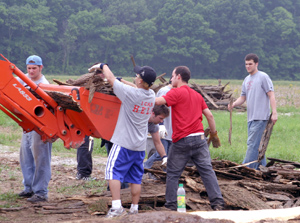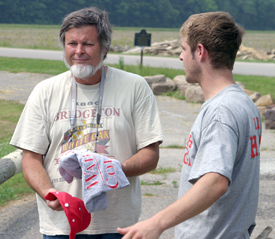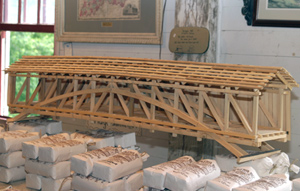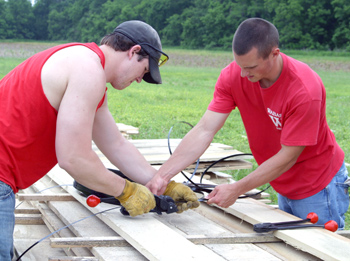Bridgeton, Ind. – Help has poured into tiny Bridgeton since the April 28, 2005, arson fire that destroyed what is often called Indiana’s most photographed covered bridge. Thursday more than 20 Wabash students and staff joined the effort.
 Spurred by the Present Indiana project, 24 Wabash students and staff traveled to tiny Bridgeton in southern Parke County to help sort lumber, clean up the work yard, and be a part of history. (See photo album from Bridgeton day here.)
Spurred by the Present Indiana project, 24 Wabash students and staff traveled to tiny Bridgeton in southern Parke County to help sort lumber, clean up the work yard, and be a part of history. (See photo album from Bridgeton day here.)
"Having the opportunity to contribute to the rebuilding of the Bridgeton covered bridge was a rewarding experience," John Meara ’07 said. "To stop and think about what was happening was amazing. The bridge was destroyed by arson last April, but the response in reaction to the destruction can only bring a smile. Many individuals in Bridgeton have been instrumental in organizing the rebuilding efforts, ranging from simple monetary donations to back breaking labor.
"It is evident that there will be another Bridgeton covered bridge, which will serve old and new purposes for generations to come. The Wabash College presence was truly appreciated. It meant something to the people of Parke County that we were able to organize an effort and deliver 24 students and staff willing to help."
 Meara is studying Parke County bridges as part of the Present Indiana project. Present Indiana, funded by Lilly Endowment, provides an eight-week summer internship for students to study historical and cultural aspects of the Hoosier state.
Meara is studying Parke County bridges as part of the Present Indiana project. Present Indiana, funded by Lilly Endowment, provides an eight-week summer internship for students to study historical and cultural aspects of the Hoosier state.
The students arrived under cloudy skies, misty rain, and foggy terrain. But the Wabash men jumped into projects which ranged from stacking lumber, picking up bark, putting a sealant on lumber, and cleaning up wood piles.
"I would say the average age of our volunteer is 65." Bridgeton Covered Bridge Association President Mike Roe said. "On weekends we get more than enough help but through the week it’s just retired guys. Those guys were thrilled to hear the Wabash students were coming. There are a lot of little jobs like picking up the bark, they don’t want to do that and some of them physically can’t do it. Jobs like painting these boards and things, it’s little jobs that have been put off because they’re labor intensive. This is just a God send to us."
 Roe coordinates volunteer efforts which have driven the project since it begun. The 267-foot long bridge was built in 1868. The town and reconstruction organizers hope to have the new bridge ready by the October Covered Bridge Festival, though Roe admits it’s going to be tough to make that deadline.
Roe coordinates volunteer efforts which have driven the project since it begun. The 267-foot long bridge was built in 1868. The town and reconstruction organizers hope to have the new bridge ready by the October Covered Bridge Festival, though Roe admits it’s going to be tough to make that deadline.
Roe often has anywhere from 8 to 18 daily volunteers through the week and weekend. Area farmers have donated the huge poplar and oak trees necessary to rebuild the bridge. The builders have estimated it will take 2,000 volunteer hours to complete the work.
A Zionsville firm and local contractor and sawyer Dan Collom will do the actual construction after being awarded a contract on a bid of $125,000. The community has raised nearly $200,000 for the reconstruction effort. Three area lumber companies have donated crews to take down 250 trees and move them to Bridgeton.
But, it’s the volunteer spirit that has made the project possible. Roe is quick to point out when other bridges were destroyed in Parke County there was always talk of rebuilding them but it never happened.
 "It’s unbelievable," he said of the volunteer outpouring. "I just didn’t believe things like this could happen today. You just hear so much bad news - just bad, bad, bad. There are a lot of good people out there and they’re coming here to help. They’re offering their services, money, equipment, and time. It’s absolutely amazing."
"It’s unbelievable," he said of the volunteer outpouring. "I just didn’t believe things like this could happen today. You just hear so much bad news - just bad, bad, bad. There are a lot of good people out there and they’re coming here to help. They’re offering their services, money, equipment, and time. It’s absolutely amazing."
The volunteer efforts go beyond the makeshift lumber yard. Ladies from the Bridgeton area take turns preparing lunch on work days. They had an extra-large crowd to feed Thursday.
The spirit spilled over to the Wabash students when they saw how much their efforts were appreciated.
"In addition to volunteering for the construction, it was great to work side by side fellow Wabash men, who were willing to donate their time and strength out of the goodness of their heart," Meara said. "They were not paid, but recognize the value and importance of such matters. While it may be just a covered bridge for some, for others, it is an important historical landmark symbolic of Westward expansion and Indiana heritage and culture.
"It is home to thousands of memories, from the citizens of Parke County, to those who make the pilgrimage to the nation’s largest covered bridge festival. Experiences such as today are good for the soul. They also help remind me why Wabash College is such a unique place. It was great to see Wallies live up to our name, and ‘live humanely.’ "
Jesse Payne, who was charged in the arson - and an attempted arson the same day at the Mansfield Covered Bridge, about 10 miles away - was institutionalized after he was determined to be incompetent to stand trial.
In photos:
Top right: Guys load up bark cleaned from the lumber yard. Center left: Meara presents Roe with a Wabash hat and t-shirt. Center right: A frame model of the new bridge sets in Roe's mill. Lower left: Morgan Nolan and Nathan Bates band wood the Wabash guys had stacked.